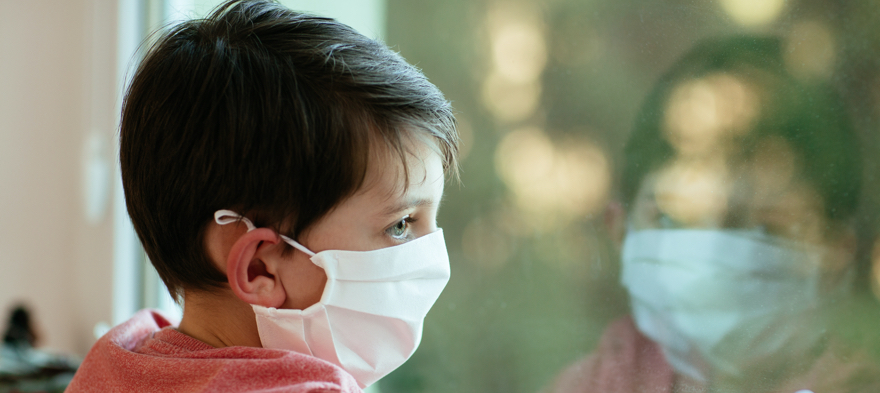
Mar 26, 2020 12:00:00 AM
To call the last few weeks hard, unprecedented and surreal feels trite. We are facing a pandemic unlike any in the last century and it is only a matter of time before it impacts each of us in deeply personal ways. We are going to experience loss on so many levels. Loss of loved ones and loss of highly anticipated experiences like weddings, graduations and reunions are just the tip of the iceberg. To say that this pandemic is going to change us may sound hyperbolic but it is not.
I co-founded and lead a relatively small non-profit, and I am deeply driven by our mission to advocate for the rights of students with disabilities. I pride myself in striving to “box above our weight” every single day, and my head is spinning as I try to figure out what my team and our organization can collectively do to possibly ease the impact of this pandemic on students with disabilities. That is, students for whom far too many people are entirely too comfortable marginalizing and accepting significant achievement gaps even when we know they can achieve so much more.
Do we put our energies into fighting for the civil rights laid out in Section 504 of the Rehabilitation Act of 1973 (Section 504) and the Individuals with Disabilities Education Act (IDEA)? Unequivocally, yes. Generations of advocates have fought tooth and nail to have Congress pass these laws, and they have spent the years since then fighting in the courts to ensure they are upheld as intended. However, [pullquote position="right"]I increasingly find myself wondering, am I focusing on the wrong goal?[/pullquote]
With a moment to pause and reflect on what I have learned over the last two weeks of in-home isolation, I have landed on one major takeaway: We must change how we are framing our conversations. I have participated in dozens of virtual meetings and have read everything I could process about how our highly decentralized public education system is responding. Folks, [pullquote]the stark reality is that we need to accept that this is not a short-term situation. It is a marathon, not a sprint.[/pullquote]
Schools are not going to reopen this school year, and I do not think we can count on schools opening in September. Some cities, those like Seattle that were hit hard early on and may have developed herd immunity, may actually be able to open. But regions that saw the arrival of COVID-19 later in the game most likely will not.
In epidemiology, a key metric of an epidemic is the “doubling rate,” that is, how many days it takes for the number of cases to double. While acknowledging that our maddening inability to conduct widespread testing leads to most likely exponential undercounting, worldwide, it took three months to document 100,000 cases and 12 days to reach 200,000. Epidemiologists have calculated that COVID-19 has a doubling rate of six days. In the U.S., we have seen our confirmed cases grow exponentially in the last week to more than 75,000 confirmed cases on March 26th. I don’t have a crystal ball, but the CDC says we are in the “acceleration phase.” The doubling rate is going to continue to decrease with the cases growing exponentially.
With this in mind, we need to stop talking about what will happen in two or three weeks and step back and acknowledge:
It is only in accepting the inevitable loss of the rest of this school year that we can reframe our allocation of resources to address students’ most basic needs in the short term, and develop a plan to address their longer-term needs come next September.
Lauren Morando Rhim is a researcher, consultant, and advocate for children. She co-founded and serves as executive director of the National Center for Special Education in Charter Schools, which advocates for students with disabilities in the charter sector through focus on collaboration, policy advocacy, technical assistance, and research. Rhim has a Ph.D. in education policy from the University of Maryland and has published extensively about school reform and specifically, issues related to equity in the charter sector. She regularly consults with federal, state and local policy leaders as well as practitioners.
The story you tell yourself about your own math ability tends to become true. This isn’t some Oprah aphorism about attracting what you want from the universe. Well, I guess it kind of is, but...
If you have a child with disabilities, you’re not alone: According to the latest data, over 7 million American schoolchildren — 14% of all students ages 3-21 — are classified as eligible for special...
The fight for educational equity has never been just about schools. The real North Star for this work is providing opportunities for each child to thrive into adulthood. This means that our advocacy...
Your donations support the voices who challenge decision makers to provide the learning opportunities all children need to thrive.
Ed Post is the flagship website platform of brightbeam, a 501(c3) network of education activists and influencers demanding a better education and a brighter future for every child.
© 2020–2024 brightbeam. All rights reserved.
Leave a Comment